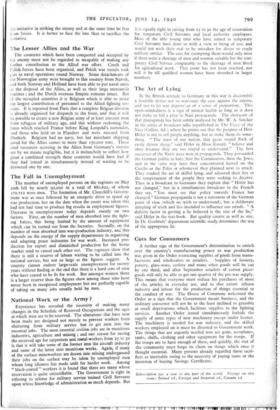The Fall in Unemployment
The number of unemployed persons on the registers on May loth fell by nearly 92,000 to a total of 880,822, of whom 570,712 were men. The formation of Mr. Churchill's Govern- ment was at once followed by an energetic drive to speed up war production, but on the date when the count was taken this had not had time to produce big results in employment figures. Decrease in unemployment today depends mainly on two factors. First, on the number of men absorbed into the fight- ing forces, this being limited by the amount of equipment which can be turned out from the factories. Secondly, on the number of men absorbed into war-production industry, and this depends on the energy of the supply departments in organising and adapting peace industries for war work. Increased pro- duction for export and diminished production for the home market tend to cancel each other out. The registers show that there is still a reserve of labour waiting to be called into the national service, but not so large as the figures suggest. A country cannot endure large-scale unemployment for twenty years without finding at the end that there is a hard core of men who have ceased to be fit for work. But amongst women there is a larger reserve than the figures show among those who have never been in recognised employment but are perfectly capable of taking on many jobs usually held by men.






























 Previous page
Previous page